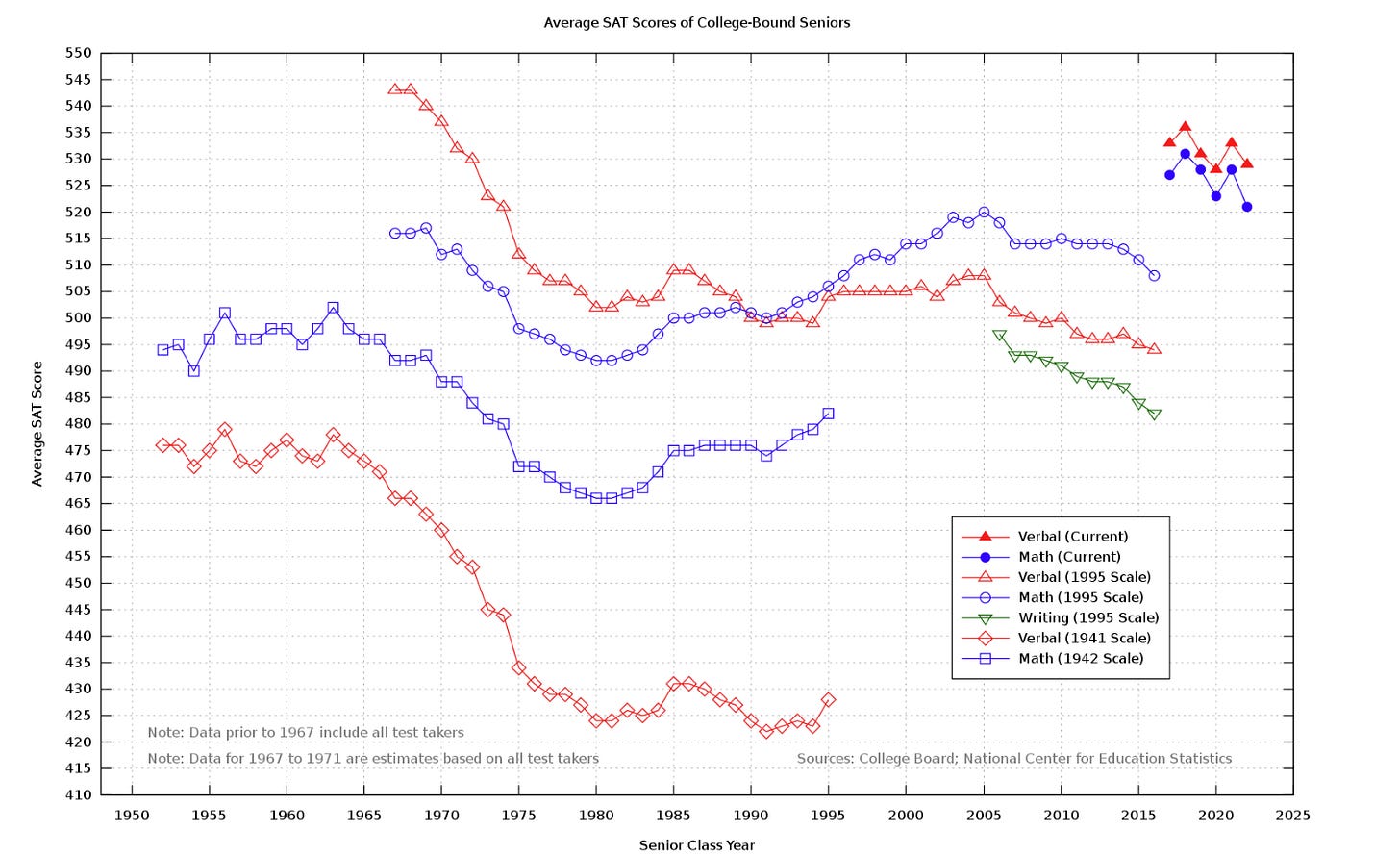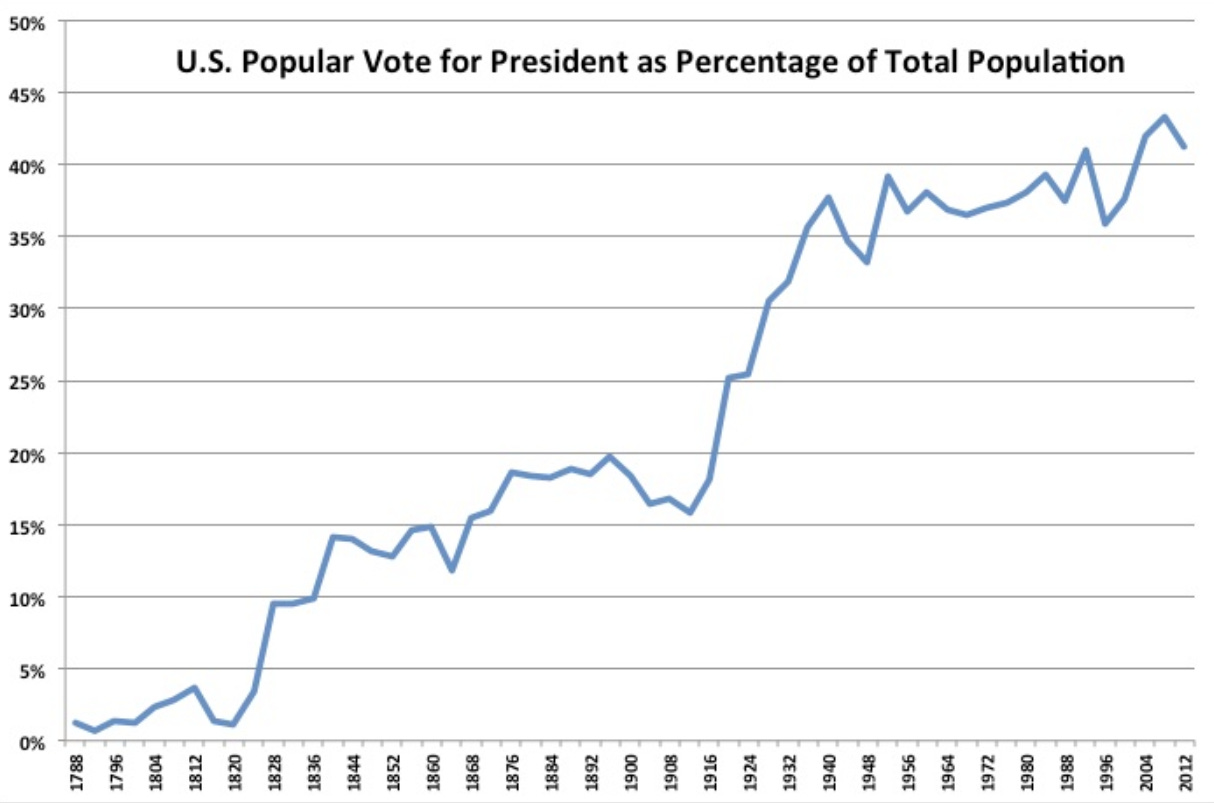I was talking with a lifelong schoolteacher recently. Over 20 years teaching in the same district, high school history at a decent-to-good public school. That’s a long enough time to see potential changes in the makeup of our “citizens of the future”. I asked her, Are the kids getting dumber?
She didn’t seem to think “dumber” was the right word. But she noticed that it can be more difficult to keep kids attention than when she first started teaching. They try to make lessons more interactive, break a standard period into shorter segments. Maybe the kids in certain places are all right, but something seems to be happening across our institutions.
Anytime I’m interfacing with the frontlines of our corporate and government entities I feel as if things have gotten more incompetent. That there’s been an incremental brain drain across the board that is slowly bubbling to a critical point. Anytime I fly now I expect delays and snafus. Maybe I’m hallucinating, maybe everything is fine. But there are signs of wear beneath the surface in America.
Some like to blame COVID for disrupting the mental functioning of students and adults alike. In reality, the general cognitive decline has probably been going on for awhile. In 1942 the SAT was set so that the mean score on each section would be 500. Over the course of the next few decades the performance of test-takers dropped so precipitously that in 1995 they decided to rescale the scoring to inflate the mean back to 500.
University professors have chimed in with anecdotes that indicate they feel our citizen pipelines are no longer “sending their best”.
It’s a funny paradox of modern times. We undoubtedly know much more than our ancestors, but we may not necessarily be “smarter”. You can speculate all-day on why this may be the case. Is it breeding patterns? migration? education failure? goal-posts moving downwards? tech-inflicted?
Rather than diagnose causes, it’s interesting to consider some implications of the deterioration, particularly in the political arena.
The Dumbing Down of Politics
Listening to the great speeches of yesteryear, the tone and language that were incorporated into political theater stick out. Even a populist “working man champion” like William Jennings Bryan spoke with an eloquence that has been mostly eradicated from the discourse today.
A modern state of the union address sits at roughly a 7-9th grade reading level, compared to speeches prior to 1920 which were almost all in a collegiate or above vernacular. Is it a case of our candidates and leaders becoming dumber? Or are the leaders simply stepping down to the mean level of their electorate?
I think the shift was probably led by the latter, but over time the race to appeal to the masses has thrusted leaders into power who might not be the brightest bulbs. For most of early American history voting was rather restricted. There was no incentive in pandering to the uneducated and non-property holding class.
A consequence of everyone voting is in theory you could win an a election if you are universally beloved by the dumbest 51% of the populace. Given that high level intellectuals are a statistical rarity there’s really little reason to try and court them amongst your base.
Political donors have historically enforced some level of baseline decorum. This is waning though as money becomes less influential on winning elections in the internet age. Bloomberg’s billions couldn’t get him close to the Democratic nomination in 2020.
People love to make fun of Kamala Harris for her “sing-songy” nursery rhyme style of speaking. But we’re likely headed to a future where a sort of child-speak becomes commonplace in politics. The intellectual depth of your 2032 presidential candidate may resemble that of a corporate social-media account.
You see examples of this all over the place. The NYC mayor’s office promotes a mantra of “get stuff done”. Gone is any sort of pretense of formality or regality. We’ve entered the age incoherence. Of speaking to the lowest common denominator.
Mass Appeal and Its Consequences
It’s quite rare for anything great to come out of an effort to pander to the masses. By definition it’s likely a path to mediocrity. Such is the game of politics in democracy though.
To win today you simply need a lot of attention and a level of likability. Excellent leadership and ideas are a nice, but they aren’t gonna move the needle. Most candidates are just parroting stuff regardless. The true skill of a political titan is in penetrating our dwindling attention spans. I expect politics to continue developing into a circus of different classes of provocateurs.
The Absurd Promisooor
Imagine the kid who ran for class president on the platform of banning homework, except he’s grown up and running for real office now. A candidate promising undeliverable riches and policies to their base. It’s a great way to make headlines and grab eyeballs, nobody is going to sweat the details these days.
Yang pioneered this style with his $1000/month “freedom dividend”. It was enough to launch a nobody into the discussion but he lacked the charisma and carnival barker attitude to really take it to the next level.
The Scandalous Firebrand
Perpetually embroiled in controversy. A campaign of passionate vulgarity. Every scandal is an opportunity to get their name out and rally up energy amongst their base. They’ll leak out salacious stories to the press, the goal is just to make as many headlines as possible.
Over time their appeal becomes completely divorced from any ideas or policies. It’s an entertainment show. They garner votes from those looking to get another season of the public spectacle.
The “Everyman”
The guy who really leans into not being “an elite”. He’s down to earth, he’s just like you. For a long time we’ve forced our politicians to pretend they relate to the average joe. They campaign in local diners, walk around the Iowa State Fair eating corndogs. The 2022 Pennsylvania Senate race took everyman politics to the next level though.
Suit man vs. Carhartt man. The doctor pitted against the stroke victim. The typical blue team against red team battle shifted to a referendum on what class of individual should be leading the nation. In spite of struggling to put together sentences, Fetterman prevailed over Dr. Oz by a pretty decent margin. The victory was proof of the “relatable dunce” being a very viable campaign strategy.
Now you may be reading this horrified at the political picture being painted. Whenever politics gets brought up in a discussion these days I find people always talk about being sad at the state of things and embarrassed about the quality of the candidates.
Myself, I’m an optimist. If you’d like to see some sort of change in the systems, things are probably going to have to get worse before they evolve. Big shifts occur when there’s a breakdown and bottoming out period. For now, I’ll just sit back and enjoy the circus as it marches on.













The problem with sitting back and enjoying the circus is all the clowns are going to drag us down with them.
We live in the era where virtue signaling is more important than actual results. the typical person's thought process begins and ends with "it sure would be great if _________" and they never think through the unintended consequences. Let's power our grid with intermittent sources of energy (wind and solar). Let's outsource our manufacturing to a country that hates us and wants to ruin us (China). Let's borrow ever increasing amounts of money so the dollar will be worth less than a peso. Let's pretend men can be women and visa versa. Let's pretend toddlers or even teenagers can determine what sex they are. Let's pretend that only white people can be racist. Let's pretend that being grossly overweight is healthy (and attractive).
It's all nonsense... the only thing I'm not sure about is if this was the plan or it's occurred naturally. Maybe Idiocracy was a documentary after all.
Good thing is, these elected clowns are nothing but props. I don’t see how this trend will change anything about the people who actually run the show (donors). So while vibe/ambience may be changing (unquestionably downwards), the substance should be stable.